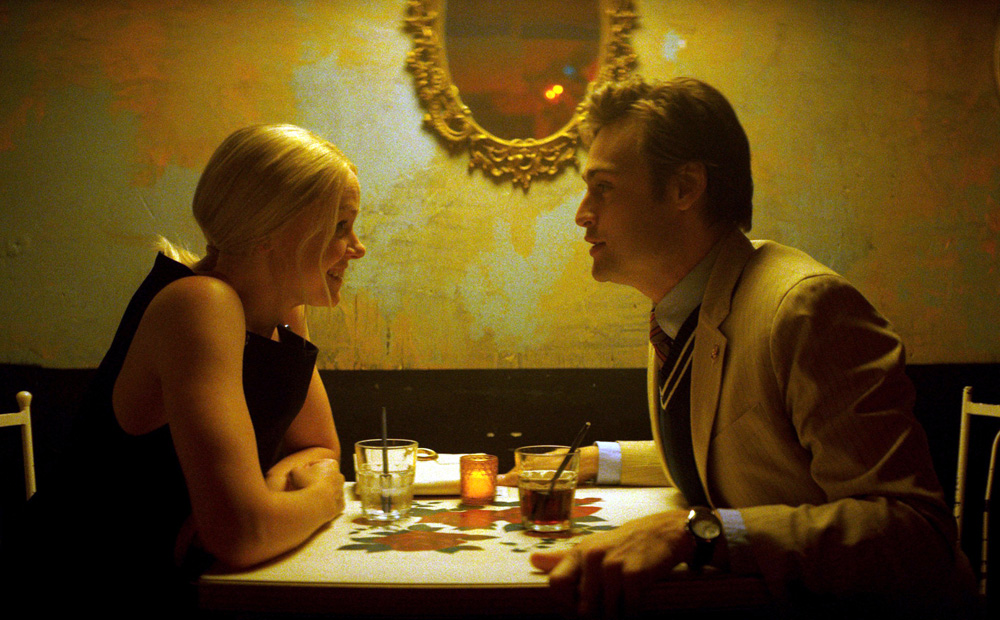José Avelino Gilles Corbett Lourenço wasn’t around for the initial literary craze that greeted Johann Wolfgang von Goethe’s “The Sorrows of Young Werther” upon its publication in 1774, but its notoriety ensured that it would be on a college reading list the writer/director had centuries later. Although the novel might not have hit him quite as deeply as it did some during its initial heyday, prompting a handful of countries to ban it when the tale of unrequited love was said to inspire a few suicides amidst its broad popularity as a fizzy romance, it stayed with him through the years when he didn’t see it as a tragedy, but instead as a tale of a young man fumbling his way through relationships that would eventually shape the person he would become.
Lourenço may not have had the same romantic travails as Werther to draw on, but when it came time for him to make his feature directorial debut, he could identify with the enthusiastic young man looking to pour his energy into something meaningful, having all that creativity taking multiple forms over the years as he awaited such an opportunity, honing his filmmaking skills on commercials and writing stories for children’s books. That pent-up energy immediately comes across in “Young Werther,” a delightful comedy that practically explodes off the screen in a way befitting of its lead played by Douglas Booth, who thirsts for life when it could serve as material to write about. He’s on his way abroad for such adventures when he ends up finding one right under his nose in his native Toronto, enjoying a gelato at Bar Ape when he spots Charlotte (Alison Pill) and the conversation grows captivating enough that he doesn’t take notice of her engagement ring. When it turns out her circle of friends overlaps with his own, he believes she could simply exist as part of that group, but it becomes obvious that their connection cannot remain casual and while he gets what he wants as far as a story to tell, he may not as far as his heart is concerned.
The big feelings that Goethe’s novel inspired are undiminished by Lourenço, but he clearly resides on the glass half full side of things as he is moved more by Werther’s exuberance in all things he does. In following Werther and Charlotte around Toronto during a most momentous summer while her fiancé (Patrick J. Adams) is kept busy by work, the film is easy to fall in love with on its own when not only do its stars Booth and Pill clearly make a cute couple, but the city comes alive around them as marathon runners and ballroom dancers have a way of randomly entering the frame. (Remarkably, Pill sparked to the script before learning that Lourenço, with whom she once spent one such lazy summer in Toronto as part of a group of friends years ago, had written it.) Following a hometown premiere earlier this fall at its world-renowned film festival, “Young Werther” is liable to restart “Werther fever” for a new generation as it makes its way into theaters and homes on VOD this week and recently Lourenço shared how he ended up adapting the novel, being bold with color choices and how he landed such charismatic leads and a supporting cast that was also none too shabby.
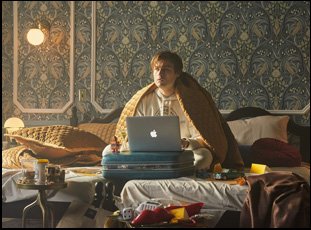 How’d you end up revisiting this?
How’d you end up revisiting this?
It was maybe kismet. I just moved to a new place and was lugging my boxes of books and DVDs and CDs and was putting them on the shelves and I pulled down [“Young Werther” and thought], why has there not been a major English language adaptation of this book? I’d read it in college and liked it fine and then when I read it again, I [thought], “This is hitting in a different way.” After having had a few romantic entanglements, this felt like it’s accessing something visceral for me.
“Franny and Zooey” ends up making its way in, as well…
That honestly would have been only a few books over. “Franny and Zooey,” “Catcher in the Rye,” the short stories, “A Good Day for Bananafish,” all the Salinger stuff is definitely up there and [“Franny and Zooey”] came because in the original novel, there’s this moment where Werther and Charlotte really connect over an epic poem that he’s reciting, and I [thought], “What would be the modern version of that?” It’s definitely this Salinger book that has as many of the same themes as the film.
Was it fun finding analogues between the past and the present?
It was. Clara Vernon, the production designer, did such an incredible job. We talked early on about having it be this world that felt out of time a little bit in the same way that Werther, as a character, is out of time. I wanted it to feel contemporary, but not fully fairy tale-ish, just this slightly askew world that feels like a place that we can inhabit and in terms of reality, there’s one foot off the ground, a world that you can float through a little bit and let the romance and the whimsy carry you through.
We talked a lot about the color journey in the film with the production designer and the costumer and our cinematographer, how very much [Werther’s] driving color is red at the beginning of the film [to reflect] his passion and his love, and Charlotte was very much in cool blues and neutrals and throughout the film as they become more meshed in each other’s lives, the reds and blues start switching. They start taking pieces of each other’s wardrobe, like actually wearing each other’s clothes throughout, and they end up in opposite poles of this color world. And all the characters have their things that pull through with wardrobe and the spaces. We wanted this maximalist vibrant world that’s full of life and possibility, just something that reflected the intensity of Werther’s feeling and how he sees the world. Did you ever watch “30 Rock” back in the day? There’s one episode where Alec Baldwin is speaking to Kenneth the page and he’s like, “I’d love to see the world how you see it, Kenneth,” and that’s like a Muppet world. And I think the world that we see in the, in “Young Werther” is very much Werther’s POV, and how he moves through space.
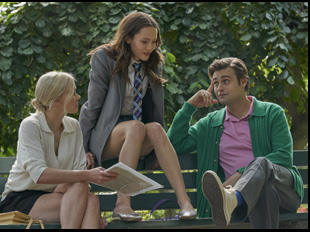 It presents Toronto in quite a loving way. What was it like to look at the city that way?
It presents Toronto in quite a loving way. What was it like to look at the city that way?
I’m not from Toronto originally, but I’ve lived here for just over 20 years and it’s where I spent my twenties and thirties and really grew up ultimately. It was exciting to be able to go to all these spaces like the AGO or the Bar Ape or the Fort York with the fireworks, just spaces in the city that are never really shown on film. Toronto is always playing Chicago or New York or Detroit or some nameless city on screen, so it was exciting to be, you know, to go down to just South of Queen Street on Victoria and shoot the exterior of a beautiful, iconic Toronto restaurant like 20 Victoria, or just go to places in the city where, you can present the world as it is and as you can experience it in a way that feels beautiful, lively and true.
Alison has said that she first met you during this amazing summer you had together 20 years earlier with this group of artists in the city. Was she in mind from the start and/or the feeling of a summer like that?
I feel like every summer throughout my twenties in this city was aspiring to be something as like wonderful as what Charlotte and Werther experience. And Alison coming aboard was amazing because we had known each other when we were younger and stayed in touch. We have a mutual friend in New York who’s one of my best friends and one of her best friends, so whenever I’d visit, sometimes we’d reconnect and see each other. But when I wrote the script, I [thought] I wonder if we could get someone like Alison because it’s my first feature and you’re hoping that you’re going to get wonderful actors. I couldn’t be happier with the way our cast came together, especially Alison. She’s such an incredible talent and not just as an actor, but a singer, a dancer. She’s unbelievable, and just so funny. She has such a verbal dexterity and can really find nuance in a character and the way that she can react and interplay in scenes. I feel so, so lucky to have had her in the cast.
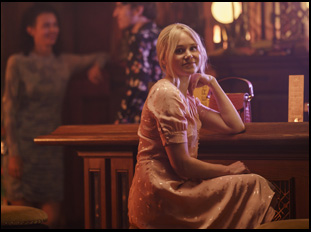 What sold you on Douglas Booth?
What sold you on Douglas Booth?
He’s incredible. What made me really take notice of him back in the day was “The Riot Club.” He’s been in many wonderful things, but I loved him in that movie so much. And it was the conversations that we had during the casting process where I was speaking with a bunch of actors and Doug really stood out to me because he really understood the character. I really feel like he is like a Cary Grant-type. He can just effortlessly access that place of a nuanced, sophisticated performance with real panache to it and depth and then he can also traverse right over into comedy and lightness with such grace and class. I feel like Doug can do anything and he’s truly a star. Just a lovely guy, off-camera as well and really so generous to everybody — cast, crew, background players. He always had time for people. He always made everyone feel respected and very much has Werther qualities. He walks into a room and it just lifts up a little bit.
When you mentioned Cary Grant, this really does have “His Girl Friday” level dialogue in it. What was it like establishing the rhythm with the actors and getting that repartee just right?
What was great is they both love to rehearse, which is amazing and it’d be amazing to have weeks and weeks and weeks, but Alison and Doug and Doug and Jaouhar [Ben Ayed, who plays Werther’s friend Paul] and everyone just found that rhythm so quickly. It’s not like there were no moments where we changed things on the fly, but for the most part, the script was the script and it was really about nailing the rhythm, but still having it feel natural rather than remembered. I’m so lucky that Alison and Doug have that ability. There’s definitely that heightened “His Girl Friday” Howard Hawks, rapid back-and-forth heightened aspect to it, but they still feel like human beings, which I think is just an astounding feat. It’s something that I know I cannot do because any time I would read across anyone, [it would sound like] Ed Wood. I’m in awe of what actors of their caliber can do.
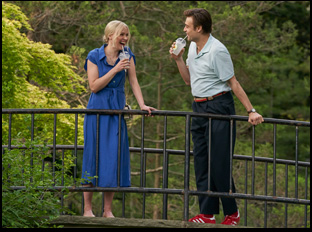 Is there anything that happened during the shoot that you may not have expected, but made it into the film and you now really like about it?
Is there anything that happened during the shoot that you may not have expected, but made it into the film and you now really like about it?
Across the board, any scene that Amrit [Kaur] was in, she’s another person who’s so smart. Her instincts are so good. She plays Melanie, Charlotte’s friend and there are just little moments that she would improvise in character. There was one thing that didn’t make it into the final edit, but I loved it so much when Charlotte first tells Werther that she’s engaged and she gets in the cab with Melanie and they’re pulling away. You can hear it a little bit [still], but Amrit improvised this thing where she was screaming, “We need to go get hot dogs,” and then we had this scene where she’s being helped into her house and she’s eating the hot dog and talking about how she loves Charlotte. It was one of those darlings that you kill along the way, but Amrit was such a force.
What’s it been like to start getting this out into the world?
I feel so lucky. I’ve been writing films since 2008, and along the way, things have come close a couple of times. I had a film greenlit at Fox about a month before Disney took over and killed Fox’s entire slate, so there are things that have been close, but I’m still processing it all because it really does feel just amazing and surreal. I can’t believe it’s happened, and I can’t wait for it to happen again.
“Young Werther” opens on December 13th in theaters and will be available on digital and on demand.




